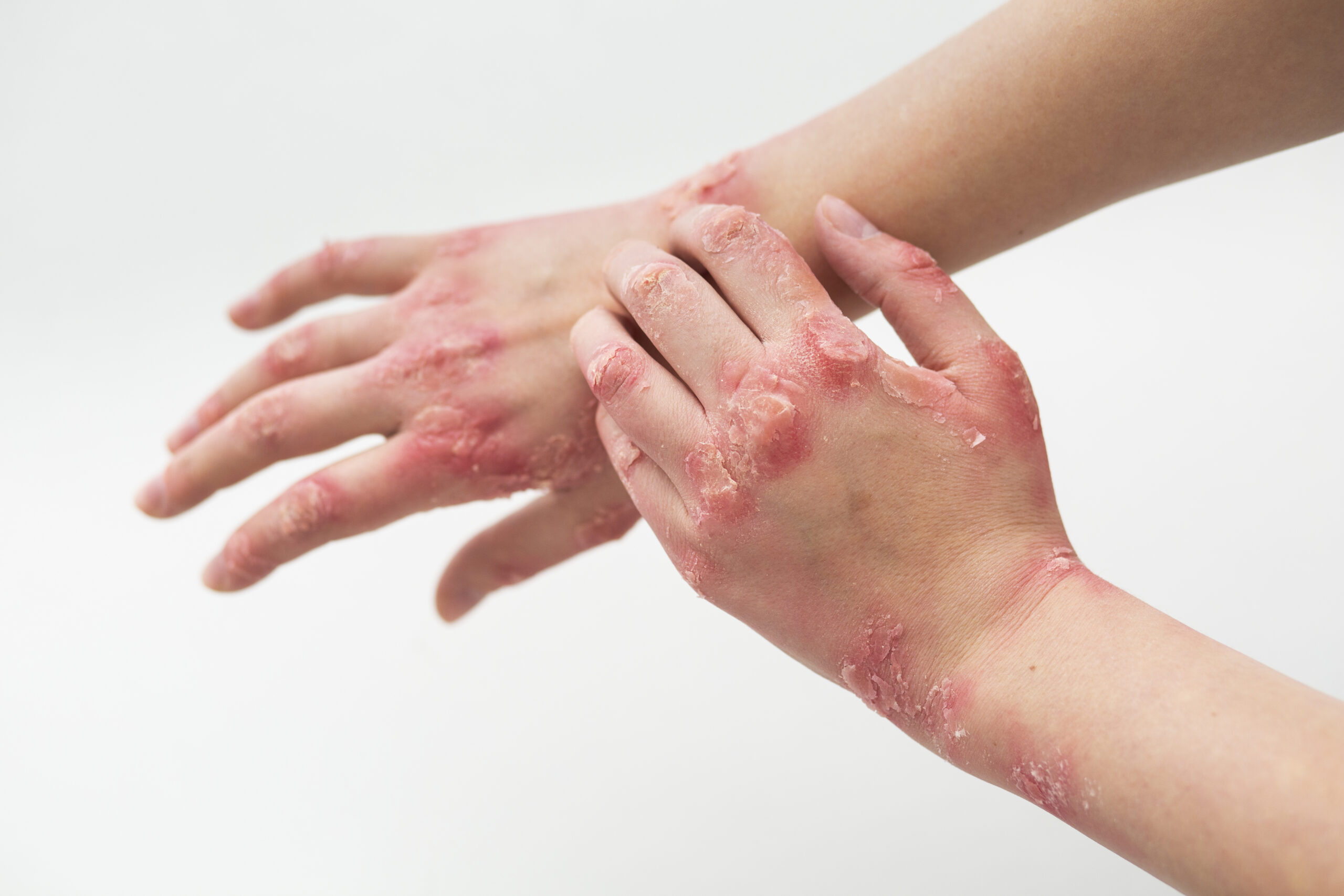
Eczema, or atopic dermatitis, is often framed as a purely skin-deep condition. But what if its relentless flares weren’t just a result of surface irritants or allergens—but instead rooted in your gut? New research into the skin-gut axis is reshaping our understanding of eczema. Scientists now believe that imbalances in gut bacteria, increased intestinal permeability (aka “leaky gut”), and chronic inflammation may be silently fueling skin inflammation—especially in those with treatment-resistant or chronic forms of the disease.
Could healing your gut hold the key to calming your skin?
What Is the Skin-Gut Axis?
The skin-gut axis refers to the bi-directional communication between the gastrointestinal tract and the skin, primarily mediated through the immune system, microbial metabolites, and inflammatory signaling pathways.
Essentially, what happens in your gut—good or bad—can influence how your skin behaves. Gut health impacts:
- Systemic inflammation
- Nutrient absorption (like zinc, omega-3s, vitamin D)
- Immune regulation
- Toxin filtration
- Hormonal balance
When your gut is imbalanced, your skin often pays the price.
The Microbiome Link to Eczema
The gut hosts trillions of microbes that help regulate immune tolerance. A healthy microbiome teaches the immune system to distinguish between real threats (like viruses) and harmless agents (like pollen or food proteins).
Research shows:
- Children with eczema often have low microbial diversity, especially reduced levels of Lactobacillus and Bifidobacterium.
- Adults with chronic eczema show signs of dysbiosis, an unhealthy imbalance in gut flora.
- Certain pathogenic strains (like Clostridium difficile) have been linked to systemic inflammation and worsening eczema symptoms.
Bottom line: A disrupted gut microbiome may cause the immune system to become hyperreactive—attacking the skin unnecessarily.
Is “Leaky Gut” Fueling Eczema Flares?
Increased intestinal permeability, commonly called leaky gut, occurs when the tight junctions between intestinal cells become loose. This allows:
- Undigested food particles
- Toxins
- Bacteria
…to leak into the bloodstream, triggering systemic immune responses.
In eczema, this may present as itchy, inflamed skin eruptions, especially after certain food exposures or stress. Several studies have observed:
- Elevated zonulin (a marker of gut permeability) in eczema patients.
- More severe skin symptoms in those with coexisting IBS or food sensitivities.
If your skin reacts to what you eat days later, your gut wall may be compromised.
The Inflammation Circuit: Gut → Immune → Skin
The gut lining contains a dense network of immune cells. When it’s compromised, inflammatory cytokines like IL-6, TNF-α, and IL-17 are released into circulation.
These messengers can:
- Trigger mast cell activation in the skin
- Disrupt skin barrier function
- Promote chronic Th2-dominant immune responses (typical in eczema)
This sets off a vicious loop: gut inflammation leads to skin inflammation, which increases stress—further damaging the gut.
Healing the Gut to Calm the Skin: What Works?
1. Probiotics
Strains like Lactobacillus rhamnosus GG and Bifidobacterium lactis have been shown to:
- Reduce eczema flares
- Improve skin hydration
- Modulate immune responses
Probiotic therapy is especially effective when started early in children, but some adults also benefit after 8–12 weeks of supplementation.
2. Prebiotic-Rich Diet
Fiber-rich foods like onions, garlic, chicory root, and bananas feed beneficial bacteria. Prebiotics help rebalance the microbiome and increase SCFA (short-chain fatty acid) production—key for skin-calming anti-inflammatory effects.
3. Elimination Diets
Removing common gut triggers (like gluten, dairy, soy, or eggs) may reduce both gut and skin inflammation. Testing for food sensitivities can offer guidance.
4. Glutamine & Zinc
L-glutamine helps seal the intestinal lining, while zinc supports gut integrity and skin repair. These supplements are often used in leaky gut protocols.
5. Stress Management
Chronic stress increases cortisol, which damages gut lining, reduces good bacteria, and weakens skin barriers. Practices like meditation, breathwork, and yoga can support both the gut and skin healing.
What the Latest Research Says
- 2024 (Frontiers in Immunology): A meta-analysis of 15 clinical trials found that modulating the gut microbiome reduced eczema severity by 35% on average.
- 2023 (Nature Reviews Gastroenterology): The authors emphasize the “gut–skin axis as a viable therapeutic target” in autoimmune and inflammatory skin diseases.
- 2022 (Journal of Dermatological Science): Leaky gut markers were found in 72% of adults with chronic eczema, even in the absence of GI symptoms.
Clinical Takeaway
If your eczema isn’t improving with creams, antihistamines, or even biologics—your gut may be the missing piece. While topical treatments manage surface symptoms, they don’t address the root systemic dysfunction. The skin-gut axis offers a more comprehensive, long-term approach that addresses immune overactivity, gut permeability, and microbial imbalance simultaneously.
Healing your gut may not just improve your eczema it may reduce your whole-body inflammatory load.
FAQs
How does the gut microbiome affect the skin in eczema?
An imbalanced microbiome can trigger immune dysregulation, leading to skin inflammation, increased sensitivity, and chronic eczema flares.
Can probiotics really help eczema?
Yes, specific probiotic strains have been shown to reduce inflammation, improve skin hydration, and lower flare frequency especially in children.
What is the best diet for the skin-gut axis?
A high-fiber, anti-inflammatory diet rich in prebiotics, fermented foods, and omega-3s supports both gut and skin health.
Can a leaky gut cause eczema?
Leaky gut may contribute to systemic inflammation and trigger immune responses that manifest as eczema—especially in chronic or unexplained cases.
Should I get gut testing if I have eczema?
Comprehensive stool and food sensitivity testing can uncover microbial imbalances or hidden triggers that may be exacerbating your skin symptoms.
